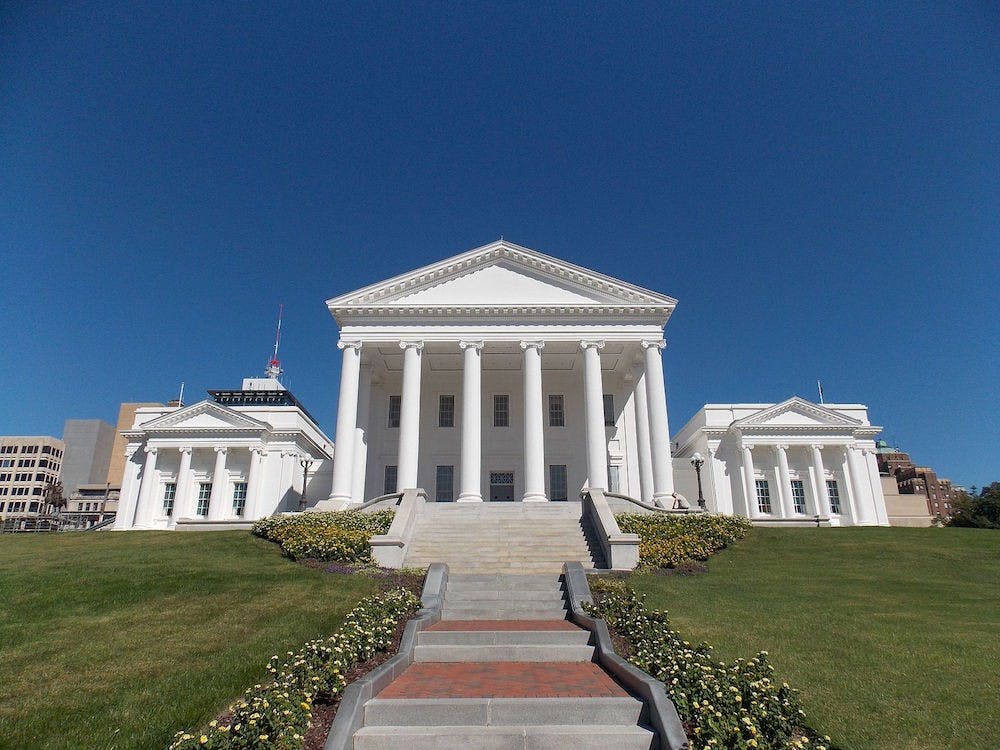The University of Richmond will be divided between the 14th and 16th Virginia Senate districts and 78th and 58th House of Delegates districts starting in 2023 as a result of Virginia’s redrawn congressional maps.
In the new maps, which were approved Dec. 28, 2021, by the Supreme Court of Virginia, the Gateway Village Apartments and the University Forest Apartment blocks 100-1200 will fall under the Senate's 16th District and the House's 58th District. The rest of campus will be part of the Senate's 14th District and the House's 78th District, according to data compiled by the Bonner Center for Civic Engagement.
Prior to the redistricting, UR was split between the 10th and 12th state Senate districts, represented by Democratic Sen. Ghazala Hashmi and Republican Sen. Siobhan Dunnavant, respectively, and the 68th and 73rd House districts, represented by democratic delegates Dawn Adams and Rodney Willett, respectively.
The Jepson Alumni Center is the UR polling place for all campus addresses except UFAs 170 A-H UR Drive and Gateway. Students whose housing falls under the other district must vote off-campus or absentee.
"Students should update their voter registration status every time they move physical residences, even if that residence is within the same voting district," wrote Sasha Hollister, program manager of community relationships and UR downtown for Bonner Center of Civic Engagement, in an email statement. "We encourage all students to check their registration status and polling location each year. The CCE provides transportation to the Henrico polling place for students who reside within Henrico County on-campus residences."
Redistricting happens every decade, but this was the first time the Virginia maps were drawn by two experts, referred to as special masters, instead of legislators.
The "special masters" were appointed by the Supreme Court of Virginia after the Virginia Redistricting Commission failed to reach an agreement. The Commission was composed of eight legislators and eight citizen members who were nominated by legislators and picked by a panel of retired judges. Virginia is now one of 23 states with a redistricting commission of some form.
Sophomore Danny Anderson, a legislative intern for Del. Mark Levine, D-Alexandria, said it wasn't surprising that the Commission reached a deadlock.
“Any two delegates or any two senators on the commission of 16 could block the entire bipartisan Commission's redistricting maps, so it was designed to be easy to not come to a solution, and that's exactly what ended up happening," he said.
Anderson considers the new maps much fairer than the products of previous redistricting processes, he said.
“When we had legislators drawing them, [they] were overwhelmingly trying to protect incumbents of both parties, and they were also trying to push their own party's advantage,” Anderson said. “Here, we saw very little protection of incumbents in the redistricting, which is very unlikely to have happened otherwise, and we also saw no partisan advantage, according to most statisticians.”
U.S. Reps. Elaine Luria, Jennifer Wexton and Abigail Spanberger were all disadvantaged by the redistricting, Anderson said. Spanberger’s 7th District was moved from suburban Richmond to Northern Virginia.
Enjoy what you're reading?
Signup for our newsletter
“It's possible that all three of them could lose their seats because of this, and at that point, we would have no women representing Virginia in Congress out of our 11 seats, so that's a concern,” Anderson said. “But, given the horrible way we used to draw maps in Virginia, I think it's hard to argue that this isn't better.”
Political Science Professor Anthony Sparacino doesn't think the maps are going to make the districts much more competitive, aside from Spanberger's, he said.
“Generally speaking, in terms of overall delegation, you know, by party, by ideology, I don't potentially see much of a change happening because of the redistricting itself," Sparacino said. "Maybe the districts might overall become a little bit more 'efficient' and [have] less wasted votes, you know, maybe a little bit more competitive at the margins, but generally speaking, this doesn't look like it's going to be a huge change."
The more long-term significance to the maps is the way that they were created, Sparacino said.
“I think potentially the important thing going forward is if this holds, in terms of an independent commission really being sort of the decision-makers here and again," he said. "...The fact that there's been an attempt to sort of remove some of the partisanship from this process, doing things through a commission — again, the courts wound up having to step in here, but voters seem to, you know, approve of that.
"I think that does speak to something — the voters want this process to not be something that the parties are just doing for their advantage, but the parties have been doing this for their advantage since the dawn of the Republic, so I think that's an important point."
Contact City & State Editor Meredith Moran at meredith.moran@richmond.edu.
Support independent student media
You can make a tax-deductible donation by clicking the button below, which takes you to our secure PayPal account. The page is set up to receive contributions in whatever amount you designate. We look forward to using the money we raise to further our mission of providing honest and accurate information to students, faculty, staff, alumni and others in the general public.
Donate Now



